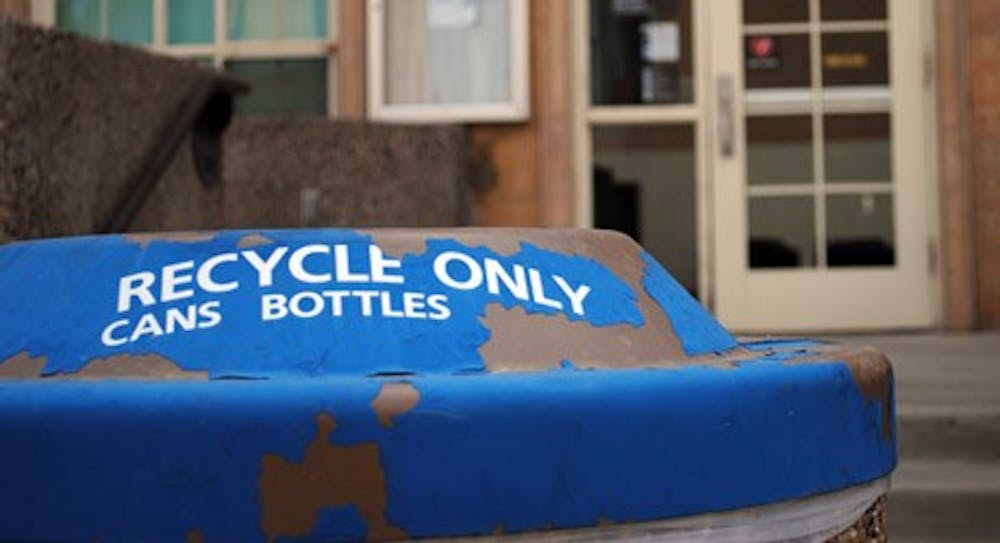Students pass recycle bins on all four campuses every day, but many return home to apartment complexes that don’t provide them with access to that service.
A new project from the city of Tempe, however, hopes to change that. The city is partnering with Recyclebank, a New York-based group that rewards communities and individuals who recycle with points they can redeem for commercial products.
Karen Bray, client marketing director at Recyclebank, said the program is in place in 29 states and the United Kingdom.
“We’re a green lifestyle community that rewards [people] for taking everyday green actions,” Bray said. “We’re really trying to encourage those small actions that make an impact and to reward those actions.”
The project took effect March 2 in 11 apartment complexes in the southwest area of Tempe, allowing residents to sign up on Recyclebank’s website and begin accruing points, said Lucy Morales, outreach coordinator for Tempe Recycling.
Tempe partnered with Recyclebank for a yearlong pilot project to increase outreach to apartment complex residents, many of whom do not realize they have access to free recycling, Morales said.
Participating complexes are located between Loop 101 and Interstate 10, and between Elliot Road and US 60, and include Galleria Palms, Garden Grove and Monarch apartment complexes, among others.
Outreach is the main challenge, Morales said. Not only do residents need to be informed of the recycling opportunities available, but apartment complex managers must also be informed of how to sign up for recycle pickup with the city of Tempe.
“We don’t, unfortunately, have a way to promote our green programs to [apartment complex] residents,” she said. “We can send information to the apartment complex managers, but we don’t know how that information is flowing to their residents.”
Recycling is completely voluntary for apartment complex owners and managers, but is offered by the city of Tempe without charge to any complex that already has trash pickup.
“While we provide recycling for all multi-family complexes, this program goes above and beyond that,” Morales said. “A partnership with Recyclebank allows residents to earn rewards for recycling so they can redeem them at Recyclebank partners.”
Bray said residents in the pilot complexes can sign up at recyclebank.com and report their recycling each week. Each pound of recycling a complex accrues earns 2.5 points. The total number of points is then divided among each participating resident.
Residents participate individually, and points are totaled and divided communally by Recyclebank.
Points can be redeemed for discounts at local and national chain stores, as well as gift cards, Bray said.
“The more points, the bigger the discounts,” she said. “The more the community as a whole recycles, the more points each resident can earn.”
The communal point system is intended to encourage neighbors to work together.
“We’re bringing the effort down to neighbors working with neighbors to take little steps,” Bray said.
Morales said increasing recycling can reduce the trash pickup expenses of apartments.
“Some apartments will have twice a week trash pickup,” Morales said. “If the program is managed correctly and residents are recycling, complexes will be able to reduce the number of trash pickup days and save money on that expense.”
Industrial engineering junior Alex Davis, director of services at the Center for Student Sustainability Initiatives, a Tempe campus group that promotes green practices, said apartment complex residents need to start demanding that recycling be available.
“Until residents sit down and demand it from the apartment managers, they’re not going to offer it,” Davis said. “Recyclebank is providing good incentives for students to recycle in apartment complexes.”
Bonny Bentzin, director of sustainability practices at ASU, said recycling plays an important role in reducing the University’s carbon footprint, reduces the amount of land used for storing waste, and prevents resources from being wasted.
In order for recycling to become second nature for people, it needs to be available wherever they go, Bentzin said.
“If we’re going to push recycling on all four campuses and then students can’t do it at home, there’s a disconnect,” she said. “If we can have consistent recycling programs across areas where students, faculty and staff go, it becomes second nature.”
Law student Paige Pataky, an executive board member of the Environmental Law Society, a group that promotes recycling on campus, said she wished her Tempe apartment complex San Portella, located near Priest Drive and 23rd Street in Tempe, were part of the pilot program.
“People don’t recycle and everything gets thrown away,” Pataky said. “All of our landfills are filling up and they’re not going to be there forever. We don’t want to be living amongst piles of trash, so I’m glad [Tempe] is reaching out.”
She said the rewards, if Recyclebank expands to the rest of Tempe, would be beneficial for tight-budgeted college students.
“Especially with the economy being the way it is today, having that type of program will increase participation,” Pataky said.
Reach the reporter at ymgonzal@asu.edu





